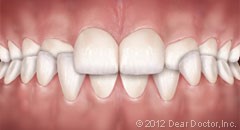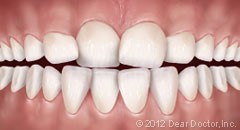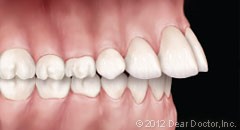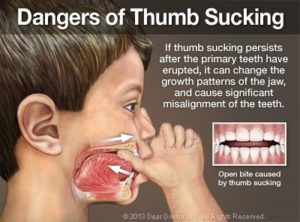While it is never too late to start, early evaluation can be important. This evaluation is not always followed immediately by treatment, often if orthodontic work will be needed children’s growth will be monitored until it is time to begin treatment.
 When Earlier Treatment is Better
When Earlier Treatment is Better
Early treatment is not always necessary, and sometimes treatment does not being until all baby teeth have been lost, and all adult teeth are present. However, some conditions are much easier to treat when the palate is soft and natural growth aids the process.

Severe Crossbite
This is a condition in which the upper teeth bite down inside the lower teeth. An expander can be used to treat this, which slowly and painlessly widens the upper jaw creating space for the teeth to bite correctly. It is easiest to do before the jaw is fully developed. Waiting too long with a crossbite can result in oral surgery.
 Severe Crowding
Severe Crowding
When the jaws are too small, the permanent teeth crowd, crossing over each other. The expander may be used here as well (and in some cases tooth extraction) to help permanent teeth emerge correctly. If Braces are required later on, the length of treatment will most likely be shorter and less complicated after expansion.
Protruding Teeth
When front teeth protrude, they are more likely to be chipped or fractured. They can also impact a developing child’s self esteem. Appliances can be used to correct this, and can avoid surgery in the future.
Correcting Bad Habits
Developing bad habits is a normal part of development, some of these habits however can be detrimental to a developing child’s health and have poor influence on development of teeth and jaw. This includes thumb sucking, tongue thrusting, and mouth breathing.
 Thumb Sucking
Thumb Sucking
This is a natural reflex from infancy, if it does not disappear between the ages of 2 and 4 it can cause issues in developing teeth. The pressure it puts on the front teeth and upper jaw cause the teeth to move apart and the jaw to change shape. These changes can lead to an open bite and potentially speech impediments. The open bite, is sometimes also caused by a tongue thrust (which is when the tongue pushes against the teeth.)
Mouth Breathing
Mouth breathing is considered abnormal when the mouth always remains open. It can cause abnormal growth of the jaws that can lead to serious orthodontic problems.
Corrective Treatments
There are many treatments available to correct these habits- the sooner they are taken care of, the less damage is caused by them. Sometimes they are not as easily recognizable as above, and that is why it is important to have a professional opinion early on.

